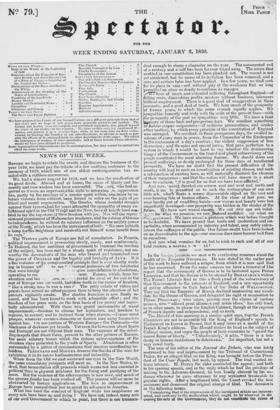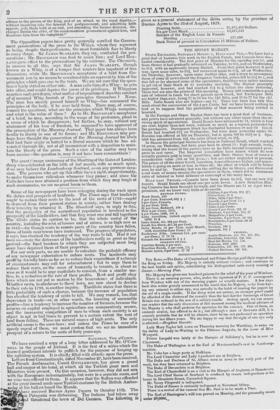In the foreign JOILTORIS ?nee Nith everlasting rumours about the
health of the Emperor NICHOLAS. He was statecrin the earlier part of the week to have suffered a relapse, from which it is now said that he has recovered. From the same sources we have a renewal of the report that the sovereignty of Greece is to be bestowed upon Prince LEOPOLD, and that his throne is to be shared by Boetaaaara's widow. The French Liberals find in this a fresh proof of the subserviency of their Government to the interests of England, and a new opportunity of giving utterance to their hatred of the Duke of WELLINGTON. They say that the Emperor of Russia declined nominating 'any candi- date for the throne of Greece, and delegated his right of nomination to Prince Pint GNAC ; who 'again, passing over the claims of various princes, who " offered great alliances and noble ideas," has only tried, as in other cases, to please the English Cabinet, though at the expense of French dignity and independence, and so forth. The Herald of this morning- in a similar spirit says, that the French Chambers are not to assemble till the King of England's speech to Parliament be known in France, that it may serve as a model of the French King's address. The Herald shakes its head on the subject of Cabinet unions, and urges the people of both countries to "guard the sacred flame of liberty.' "Unfortunately," it adds, "there is a ten- dency in human institutions to deteriorate." An important, but not a very novel truth.
The case of the editor of the Journal des Debats, who was lately sentenced to fine and imprisonment by the Tribunal of Correctional Police, for an alleged libel on the King, was brought before the Presi- dent of the Cour-Royale, last week, by appeal. The trial excited in- tense interest. M. DUPIN the elder conducted the appeal ; and both in his opening speech, and in the reply which he had the privilege of making to the Advocate-General, he was loudly cheered by his au- dience whenever he gave utterance to any sentiMent favourable to popular rights. After a lengthened trial, the Court revoked the first sentence: and dismissed the original charge of libel. The decision is in the following terms.
"Considering that if the expressions of the inculpated Intl& are inconve- nient, and contrary to the moderation which ought to be observed in dis offence to. the person of the King, and of an attack on the royal dignity,— • without inquiring into the demand for postponement, and admitting both appeals, puts them both at an end, and amending the former decision, dis- charges Bertin the elder, of the condemnation pronounced against him, and dismisses him from the complaint." -



















 Previous page
Previous page